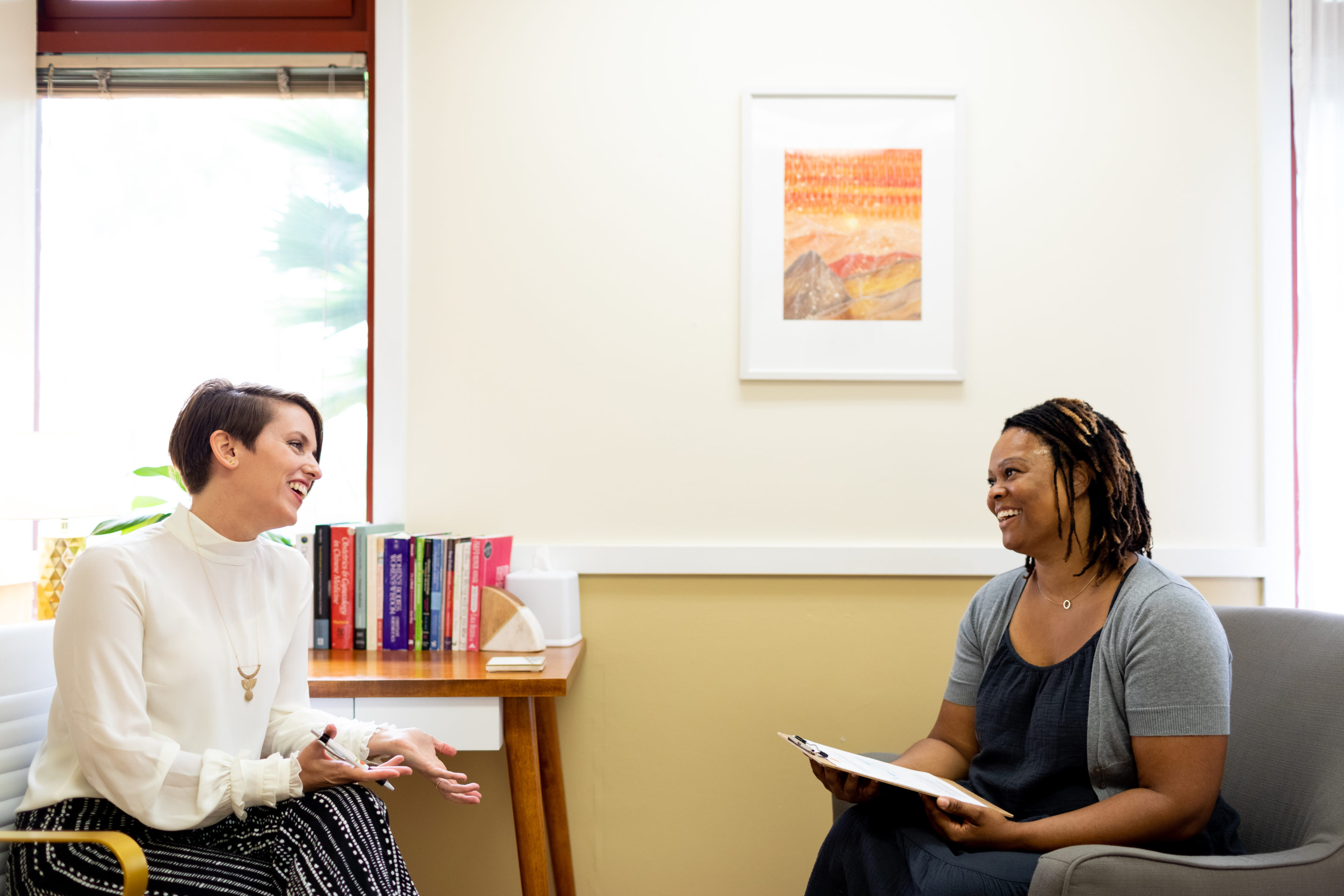Endometriosis
Please visit our PCOS page for more on integrative PCOS care.
Integrative Endometriosis Support
Endometriosis is disease in which tissue that is similar to (but not the same as) the endometrial lining is found outside of the uterus where it does not belong. It effects 1 in 10 people assigned female at birth, and often takes 7 -10 years or more to get an accurate diagnosis.
Although endo is perhaps most infamous for causing debilitating pain with menstruation and ovulation, when we take a closer look we see that endo is much more than just “bad periods.”
At it’s root, endometriosis is a complex disease that impacts and is impacted by the entire body from the immune system to the circulatory system, musculoskeletal systems, nervous system and more.
This is to say, endometriosis is complex, and therefore requires a unique and thoughtful approach to treatment.
Your symptoms are real.
You deserve to be heard.
You deserve to live well and thrive.
Our Endo Philosophy
Currently, there is no definitive cure for endo, but that does not mean there is no hope for feeling better! Above all, Natural Harmony values evidence based, connective, patient centered care. We take a “village” approach to endo, understanding that often, it takes a team of providers to fully support the endo patient.
We work closely with the best excision surgeons, pelvic floor physical therapists and mental health therapists in San Diego and can help you navigate and understand your diagnosis, and which tools may be the best option for you and your unique health needs.
Our Approach
We believe that an integrative approach to endo is a person’s best bet at sustained, long lasting vitality.
Usually, this means a well done excision surgery paired with a deeply nourishing diet, targeted movement therapy, thorough lab testing, a strategic supplement/herb plan, and acupuncture to support reducing inflammation and optimal blood flow.
We know — it’s a lot to juggle and might feel like a full time job. This is why we like to think of ourselves as your partners in wellness, helping to identify which targeted therapies are going to best serve you and how to integrate them. You don’t have to implement everything all at once, and you don’t have to do anything that doesn’t feel supportive to you. This is your journey, you get to set the course and the pace — we’re here to help you navigate and cheer you on.
With this in mind, the treatment plans we craft for our endo patients are thoughtful and well researched, designed to support your unique needs. We understand that no two endo patients are alike, and we believe that although endo is undoubtedly a challenge to live with, it does not have to dominate your life. You can thrive.
“Dr. Erin is a literal angel sent from heaven! She has helped me immensely the last few months with my endo pain. Always a pleasure to come and see her!”

Natural Harmony Reproductive Health specializes in caring for people with endometriosis, recognizing that many people living with this disease have traveled a long and often challenging road. Our practice is dedicated to providing a safe space to come share your story, receive support to meet your unique needs, and heal.

Understanding Endo
The truth is, there is a frustrating lag in modern science’s understanding of endometriosis — we don’t know for certain what causes it. There are several leading theories circulating about what might be at the root of the disease, however, with more promising research coming out every year. Thankfully, after so many years of being brushed off and misunderstood, endo is finally starting to get the attention it deserves in the medical community.
What we DO know about endo is this: endometroisis is likely multifactorial, and, similar to some types of cancer, probably has different etiologies depending on the type of endometriosis, the person’s unique genetic history and the environment a person lives/lived in. Note: although endometriosis does share some characteristics similar to cancer in how it behaves, it is important to note that it is quite rare for endometriosis to become malignant.
There are 3 primary types of endometriosis, categorized into 4 different potential “stages” (with a 5th “stage” currently being debated amongst the scientific community). These types of endo include superficial endometriosis (typically categorized as stage 1, sometimes 2), ovarian endometriomas/cysts (stage 3 + 4) and deep infiltrating endometriosis (stage 3 +4). Endometriosis is be “staged” based on the type and severity of growth. The debated 5th “stage” refers to “diffuse” endometriosis, or, severe endo found on multiple organs.
The later stages of endometriosis may cause more severe damage to the effected organs, however it’s important to note that the severity of pain and other symptoms are not indicative of the severity of the endometriosis growth itself. Someone with stage 1 endometriosis might live with debilitating pain, while someone with stage 4 may not have even known they had endo until they had trouble getting pregnant or are facing other “mysterious” pelvic and/or bowel symptoms.
People living with endometriosis may experience:
- Chronic, severe pain
- Inflammation
- Fatigue
- Infertility
- Extreme bloating
- Digestive issues
- Frozen pelvis
- Hormonal swings
- Severe PMS
- Pain with penetration/intercourse and more
Endo + Chronic Inflammation
If there is one thing we understand about endo, it’s that it is a highly inflammatory disease, and that amongst those living with endo, we often see significant immune dysfunction. There is still scientific debate, however, about whether immune dysfunction contributes to the development of endo, or if the endo lesions themselves create immune chaos simply by existing.
Some research suggests that people with endometriosis may have significantly altered immune markers, potentially having reduced natural killer cell (the pathogen destroyer cell) activity, reduced macrophage and phagocytosis (defense cell) activity, altered T cell (immune regulator) activity, increased inflammatory cytokine (cell signaling) activity and elevated prostaglandins (inflammatory hormone like substances).
A common complication of living with chronic inflammation is that over time, it will lead to scar tissue. This is an issue that people living with endo often face after years the disease impacting their body, especially in the more advanced stages of endo. Similar to what happens when you have a pimple or a bug bite that you pick at, and pick at, and (dang it, listen to that little voice in your head telling you stop stop picking!), continue picking at, eventually, as a way of protecting you from further injury, it will scab over and scar.
In some cases, scar tissue can be so severe that it interferes with the function of other organs, like the bowel, and require radical interventions like bowel resection surgery and/or removal of some or all of the reproductive organs (aka partial or total hysterectomy).
Addressing the immune system is a critical component for integrative treatment of endometriosis. This is where looking at gut health, health history and and family history become essential.
Endo + the Gut
One of the cornerstones of supporting the endometriosis patient (and often a piece that gets overlooked) is addressing the root of gastrointestinal issues. The dreaded “endo belly,” where a person with endometriosis experiences extreme bloating and discomfort, is all too common, and often (but not always) has ties to undiagnosed GI imbalances.
Two of the most common gut issues that we see in endo patients are dysbiosis (aka bacterial imbalances, most commonly seen in the gut, but also may effect the pelvic cavity, vagina and other mucosal areas like the sinuses) and intestinal hyper-permeability (aka leaky gut syndrome).
Interestingly, some research has suggested that people with endo tend to have more “gram negative” bacteria in their system, bacteria like e-coli and klebsiella, for example. In fact, there have been several studies suggesting that people with endo may be more prone to pathogenic levels of bacteria in their pelvic cavity.
Addressing intestinal hyper-permeability (leaky gut) is also an essential piece of effectively treating the endo patient. A recent study came out showing that there is a potentially significant connection between endometriosis and “leaky gut syndrome.” People with endometriosis tend to be more likely to have leaky gut, which can create a rather vicious cycle of chronic inflammation that can be difficult to get out of without some strategic support.
The good news is, we can heal the gut! And when we heal the gut, we lay the foundation to help the rest of the body heal from endometriosis.
Endo + Hormone Sensitivities
Endometriosis is an estrogen sensitive disease. This means that even in normal amounts, estrogen can aggravate endo and promote its growth. Genetics, environment and lifestyle factors can all influence this. Some of the most common triggers that may complicate hormone metabolism for the person with endo include:
- Impaired immune function
- Poor gut function
- Impaired liver detox function
- Low fiber, nutrient-poor diet
- Blood sugar imbalances
- Stress
Estrogen sensitivity is just one piece of the puzzle looking at how hormones impact endometriosis.
Progesterone resistance, where a person’s progesterone receptors (the little ‘docking zone” that progesterone land on) can also become dysfunctional with endo, essentially becoming “desensitized.” In fact, progesterone resistance, possibly in combination with chronic inflammation and estrogen dominance, may be a key piece and a common missing link for the endo patient dealing with “unexplained infertility.”
Managing hormone imbalances is one piece in the multidimensional puzzle that is endometriosis. Supporting optimal liver detox and a balanced lifestyle, taking good care of the gut, and optimizing nutrient intake will go a long way in keeping hormones happy.
I must say that I went in skeptical. How can pins and needles help me with my pain? I suffer from Endometriosis and the usual aches and pains that come with getting older…
My first session with Dr. Merritt was a lot of talking about my medical background… she truly listened. It was wonderful!
Each session I go in with pain, and I walk out with none. It’s absolutely freakin’ mind-boggling!
An Integrative Approach
We take a “village” approach to supporting the endo patient, collaborating with a patient’s care team to create evidence based treatment plans that foster hope, vitality and sustainable wellness.

Nutrition Therapy
Optimal nutrition is the cornerstone of healing from endometriosis (and we’re not talking about “the endo diet” here). Nutrition therapy for endometriosis requires a layered approach, addressing one issue at a time, ultimately fortifying the body with strategic, deep nutrition to promote healing at a cellular level. Our team will create a custom treatment plan for you based on your unique history.
Acupuncture
Acupuncture has been shown to optimize blood flow to the reproductive organs, regulate the cycle and reduce inflammation. By gently inserting hair fine needles into select points on the body, we are able to promote circulation to areas that need a little extra love, and also connect with the immune and nervous system to help reduce inflammation and pain.
Herbs + Supplements
Herbs and supplements offer powerful medicine to regulate the cycle, soothe the immune system and heal the gut. Your providers will create a custom herb and supplement regimen for you based on your cycle patterns and individual health history.
Lab Testing + Functional Medicine
Endometriosis presents with some unique patterns and health challenges. Often lab testing can help to uncover more precisely where an endometriosis patient’s body may be out of balance. Tests may range from simple blood work to functional lab testing to evaluate more subtle imbalances in the body.
Lifestyle Support
Stress management, healthy sleep, work life balance and a joyful quality of life all play a role in a successful endometriosis plan. Very often, our patients come in “tired and wired” and utterly burnt out trying to get through another day dealing with debilitating pain (we get it — this process can be downright devastating!). Our team will help you rediscover tools to cultivate a balanced lifestyle.
If you have endometriosis, or suspect you have endometriosis: we see you, we hear you, we’re here for you. Your pain is real. You deserve to be heard. You deserve to be helped, and we would love to be a part of your journey.
